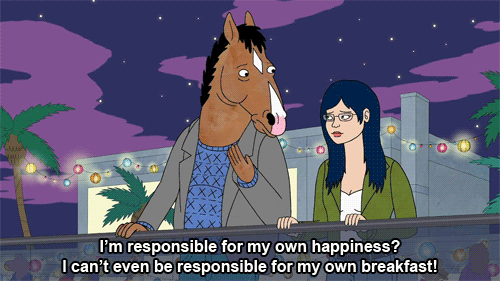Nihilism Gets a Bad Rap

Nihilism often gets a bad rap. Unlike other philosophical doctrines, nihilism is usually not a fully encompassing belief system. Although we tend to group people like Nietzsche and Camus into the nihilist camp, few philosophers or authors actively identify as purely nihilistic. Philosophers who tend to use bleak views of the world might do so in order to emphasize the reasons for holding a more positive outlook. As Camus says in The Myth of Sisyphus, “Happiness and the absurd are two sons of the same earth. They are inseparable1.” The absurdity of the universe, rather than being disparaging, can instead be an acknowledgment that we are responsible for our own purpose. It is that self determination that, while acknowledging we may live in a world void of meaning, allows us the freedom to form our own happiness.
Nihilism and Fatalism
A friend of mine once tried to define active and passive nihilism in terms of actions. He argued passive nihilism is analogues to the default state of the average America: sitting on the couch, binge watching entertainment. Active nihilism would be to drag that couch out of your house, pull it into the center of a busy intersection, and cover it in petrol before lighting it on fire.
Say someone saw no reason for humanity to continue existing, because they believed we would continue to suffer and one day go extinct. Say that person was also able to obtain a great deal of knowledge, or power, and use it to lead humanity into a nuclear holocaust, create a biological plague, or some other means to to wipe out most, or all, of humanity. That’s an active and dangerous level of fatalism, with justification being that the short-term suffering in the present will prevent millennia of suffering to come.
To contrast, let us say that someone believes that the universe does not specify a purpose for anyone. Therefore, we can choose our own purpose and find a way to give ourselves meaning and fulfillment. It may not always be an easy journey, as we’re often confined to the many expectations put on us by family, and society, as well as the desire to eat and survive comfortably. Still, this struggle against the the driving forces would seek to have us find fulfillment in our careers and positions in this world. But if there is no real meaning to our work, it leaves us free to make our own fulfillment outside of those social constraints, whether it be in family, friendships, social causes or a combination of those and other pursuits.

Some may even find meaning in their faith, believing that meaning was given by a higher power. From the view of an absurdist, this may simply be our subconscious providing meaning for ourselves. Yet even for the religious, many faiths do not follow the notion of fatalism - that we are simply tools for the gods - but that our willingness to follow Jesus, Mohamed or various other deities is an active choice. Even the Calvinist may tell you they simultaneously believe in both predestination (due to the omniscient nature of the Christian God) and free will of the individual to choose or reject God. This contradiction fits eerily well into an absurdist world view.
Being actively fatalistic may even be psychopathic; an attempt to embrace perfectionism. Such a person would be the ultimate utilitarian, increasing ones own utility and importance above all others, at any costs, no matter the risk. Conversely, being passively fatalistic could involve giving up one’s existence itself, for what would be the point in continuing to eat, drink and work, if the universe ultimately has no purpose?
“Do not go gentle into that good night. Rage, rage against the dying of the light.” -Dylan Thomas
Even the philosopher who finds the universe absurd, and without meaning, finds a way to move past the temptation to embrace fatalism. Camus says we must imagine Sisyphus happy2. Indeed creating our own meaning and purpose is the noble lie we tell ourselves to keep going.
“Existence precedes essence … so … Jean-Paul Sartre … [the] existentialist philosopher suggests that one first exists and then one creates oneself through the choices that they make. So, that’s what it means by existence; you first exist and then you create your essence, or rather that there is no pre-determined essence. You are radically free. You radically choose.” -Jared Bauer3
Morality
One fear of applying nihilism to morality is that it can lead to moral relativism. However, what if morality really is relative to a society? Claiming that morality has certain absolutes has logical dilemmas which can lead to oppression. We may think our view on morality is rational, when really, it is socially constructed and dogmatic. It was once acceptable to consider some human beings inferior to others, using justifications such as divine right or genetics. Morality grew and changed with society to fight that inequality.
Some may cling to the law as having a more rational rule set, ignoring the fact that some of our legal concepts evolved out of dogmas such as divine right of the king. To accept moral nihilism is to acknowledge that morality is not only relative, but that it needs to improve and grow to create a society that is more just and equatable for everyone.
“I was walking along the bank of a stream when I saw a mother otter with her cubs, a very endearing sight, I’m sure you’ll agree. And even as I watched, the mother otter dived into the water and came up with a plump salmon, which she subdued and dragged onto a half submerged log. As she ate it, while of course it was still alive, the body split and I remember to this day the sweet pinkness of its roes as they spilled out, much to the delight of the baby otters, who scrambled over themselves to feed on the delicacy. One of nature’s wonders, gentlemen. Mother and children dining upon mother and children. And that is when I first learned about evil. It is built into the very nature of the universe. Every world spins in pain. If there is any kind of supreme being, I told myself, it is up to all of us to become his moral superior.” -Terry Pratchett4
An animal hunting its prey out of survival can be unaware that life is cruel. The term reptile brain often refers to the idea that reptiles do not seem to form bonds or experience empathy. It’s difficult to train most reptiles beyond very simple tasks5. It is in higher order mammals where we see the first signs of what we interpret to be empathy. From that, we can only take our best guess of how human morality evolved. When we talk in absolutes about our morality, we ignore the difficult and challenging path that it took humans to collectively build, share and accept what we now think of as morality.
To take an absurdist view, morality did not exist to give life a set of rules for life to follow. Rather it was left up to humanity to evolve a concept of morality, in order for us to be able to justify our actions, either in fighting each other or thriving together.
Radical Freedom
“It was previously a question of finding out whether or not life had to have a meaning to be lived. It now becomes clear, on the contrary, that it will be lived all the better if it has no meaning.” -Camus, The Myth of Sisyphus6
It is very difficult to see the world as not having an intrinsic purpose, potentially because so much of humanity has been defined by our religion. Religion may have come about to fill in the gaps in our understanding. When Nietzsche’s mad man calls out Gott ist tot, God is Dead, it is to say humanity has moved beyond the need to ignore the question of our existence, or to be dishonest with ourselves when answering it. Camus asks the hard question: is there a reason to even continue existing if the universe is absurd and without purpose? Do we attempt to retreat back into Plato’s metaphor of the cave, embracing the shadows of what we thought the world was? Do we lose hope and decide to stand still, as the rock, which Sisyphus is cursed to roll uphill for an eternity, is left to roll back and extinguish us? Or do we allow the absurdity of the world to be our ultimate freedom, as we try to imagine Sisyphus happy2?
Nihilism is not a philosophy that intrinsically lends itself to specific patterns of thought. Just like many other belief systems, it is simply a tool. It can allow one to be radically free, as well as lead one to be hopelessly in despair. It can be used to commit incomprehensible horror, by justifying it against the meaningless of the universe, or it can be used to embrace radical kindness, as a means to create a fulfilling purpose and meaning in one’s life. To see the world as utterly without meaning, to see our universe as absurd, gives us truly radical freedom.
-
The Myth of Sisyphus, And Other Essays. 1955. Camus. (p. 133 - First Vintage International Edition, March 1991) ↩
-
Toy Story 4 (2019) – An Existential NIGHTMARE. 28 June 2019. (10:14) Show Me the Meaning. Wisecrack. (Podcast) ↩
-
Quote by Terry Pratchett. Goodreads. Retrieved on 9 November 2019. ↩
-
Film Theory: How NOT To Train Your Dragon! (How To Train Your Dragon) 23 March 2019. (11:25). The Film Theorists. (Video) ↩
-
Ibid. Camus. (p.65) ↩
